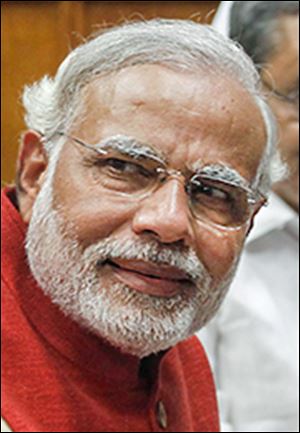
Critical India vote
4/17/2014
Modi
The United States has had a relatively easy time working with India in recent years, with Prime Minister Manmohan Singh and the experienced Congress Party in power.
National elections, which started this week and continue until May 12, are predicted to bring about a major change in the party in power — and in its head, Narendra Modi, who is likely to replace Mr. Singh as prime minister. The Indian elections are the most important development on the subcontinent right now, surpassing even Afghanistan’s elections and violence in Pakistan.
India’s economy sets the regional pace. Although its growth rate has fallen to 5 percent, the rate far exceeds that of the United States. With a population of 1.2 billion, India is the world’s largest democracy. Its elections stretch over five weeks because it has 815 million eligible voters and turnout as high as 60 percent.
The Congress Party ticket is headed by Rahul Gandhi, the great-grandson of Jawaharlal Nehru, independent India’s first prime minister. The party appears to have run out of gas in the eyes of India’s voters, 100 million of whom became eligible to vote in the past five years. The country is more urbanized, increasingly literate, and more interested in economic prospects than in older concepts of class and tradition.
Mr. Modi and his party, the Hindu nationalist Bharatiya Janata, offer change — and possibly problems. Mr. Modi has had a spectacular rise from tea seller to major business success. His economic message: If he could do it, so can others.
But he has a reputation as a Hindu extremist. He has not played a responsible role in controlling Hindu violence against Muslims as chief minister of the Indian state of Gujarat. India has 162 million Muslims, 13 percent of the population.
Muslims are also in power in troubled Pakistan and turbulent Afghanistan. India and Pakistan have nuclear weapons. Their differences, over such issues as Kashmir and the alleged sponsorship of each other’s enemies, remain raw and largely unaddressed by the United States or anyone else.
America must watch these elections closely and quickly establish a good understanding with whoever wins. For now, the storm flags are up.